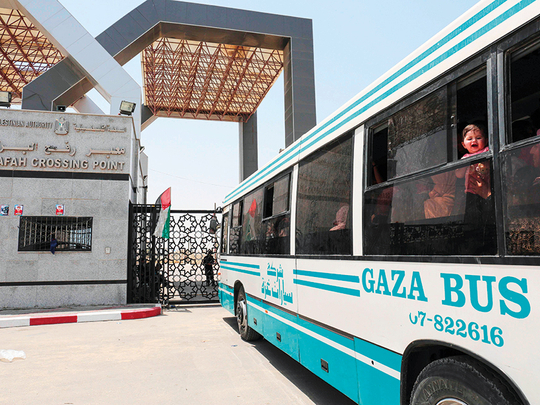
Cairo: Egypt has opened the Rafah border post with Gaza for Ramadan, President Abdul Fattah Al Sissi announced on Twitter, in what would be the longest uninterrupted period of time since 2013.
The move is meant as a humanitarian gesture during the annual holiday, one of the few occasions when Egypt allows some Gazans stranded by a 2007 Egypt-Israel blockade to leave and return to the territory.
The announcement late on Thursday came just days after Israeli occupation forces shot and killed 62 Palestinians and injured more than 2,700 during mass protests along the Gaza border.
Al Sissi wrote on his official Twitter account that the opening would “alleviate the burdens of the brothers in the Gaza Strip.”
Adham Abu Selmia, head of the Hamas-linked National Committee to Break Gaza Siege, welcomed the lengthy extension as a “positive step.”
“We hope the crossing will stay open as a normal right,” he said in a statement on Twitter, calling also for increasing the number of departures and accelerating the exit process.
The border post has been open since Saturday, so Al Sissi’s announcement is technically an extension. Egyptian authorities said 510 people crossed on Wednesday, the majority coming from Gaza into Egypt.
On Thursday, 541 people crossed from Egypt into Gaza along with dozens of trucks carrying cement, steel, power engines and medical and food aid from the Red Crescent, the officials said.
Last month, Hamas’ interior ministry said more than 20,000 people were on exit waiting lists. Through this week, an average of 500 travellers a day moved through the border, mostly leaving the enclave.
On Friday, travellers were slowly moving towards the border post, a bus arriving about every hour with people whose names appeared on lists provided by Hamas officials, who oversee who goes through the border.
Ahmad Habib, 45, a Palestinian who holds an Egyptian passport, has been trying for a year to visit relatives in Esmailia, Egypt.
“We thank President Al Sissi ... this decision came in the right time because we are really suffering,” he said as his bus waited outside the gate in Rafah. “Closing the crossing complicates the suffering.”
Al Sissi said in televised comments earlier this week that Egypt has been communicating with the Israeli regime and the Palestinians in an effort “to stop the bloodshed”. He urged Israel to “understand that the Palestinian reactions are legitimate and they should handle it very carefully”.
The Rafah border post is Gaza’s main gate to the outside world but has only had sporadic openings since the 2013 ouster of Islamist president Mohammad Mursi in Egypt. While Egypt has been struggling with insurgency for decades, militant attacks increased after Mursi’s ouster, giving Egyptian authorities more justification to tighten movement to and from Gaza.
Over the years, Egypt has opened the border post for a few days every two to three months. The announcement doesn’t change much in the daily flow of people, an official at the post said. He spoke on condition of anonymity because he wasn’t authorised to speak to the press.
Travelling has mostly been restricted to humanitarian cases, with priority given to medical patients, students admitted to outside universities and Palestinians with residency permits in third countries about to expire. Palestinian-Egyptians and dual-nationals are also eligible to apply.
Al Sissi’s announcement is not expected to ease the lengthy, complicated security procedures that turn Palestinians’ trip to the Rafah border post into a hardship. Egypt’s security and intelligence services have lists of Palestinians allegedly involved in the insurgency and anti-government attacks during the 2011 uprising that forced longtime president Hosni Mubarak to step down.












